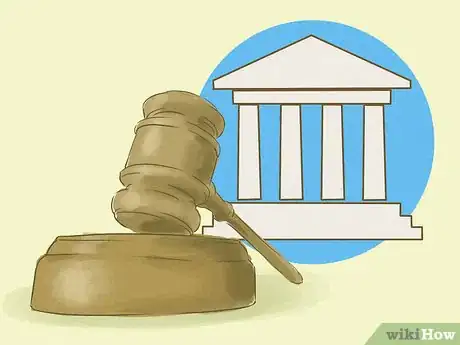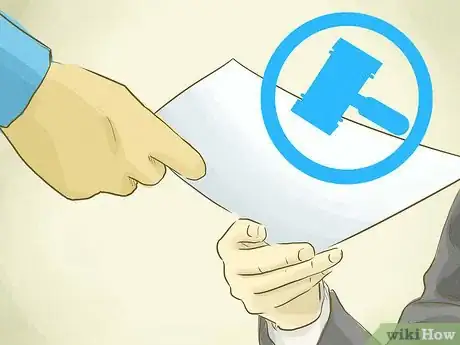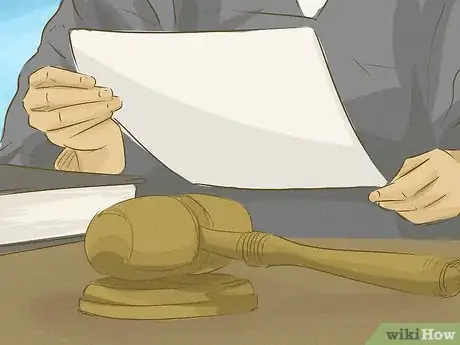This article was co-authored by Clinton M. Sandvick, JD, PhD. Clinton M. Sandvick worked as a civil litigator in California for over 7 years. He received his JD from the University of Wisconsin-Madison in 1998 and his PhD in American History from the University of Oregon in 2013.
There are 11 references cited in this article, which can be found at the bottom of the page.
This article has been viewed 41,566 times.
If you have been harmed by a person or corporation in a way that violated the law, you are entitled to file a lawsuit with the court that has jurisdiction (power) over your case. If you win your case, the court will provide a remedy for the harm you suffered, usually by requiring the person who caused you harm to pay you money. However, before you file a lawsuit, it is important that you understand the steps involved. For many, it is a long and costly process that is best to avoid if you have any other recourse available to you.
Steps
Assessing Your Case
-
1Find out whether you are permitted to sue. If you are considering suing a company with whom you have signed a contract, read the contract carefully to see whether it includes a mandatory arbitration or mediation provision. Such a provision requires that you resolve disputes out of court and therefore prohibits you from filing a lawsuit.[1]
- Mandatory arbitration and mediation provisions are commonly found in contracts with banks, insurance companies and service providers, such as cell phone and cable companies.
- If you find out a contract provision prohibits you from suing, you still have the option of pursuing the method of dispute resolution allowed by the contract. Most contracts with major companies allow only arbitration for resolving a dispute. Arbitration severely restricts your rights to discovery, making it potentially very difficult to win a case against a powerful opponent. [2]
-
2Determine whether you have a valid claim. Before filing a lawsuit, you must determine whether you have a legally valid claim. A claim is only legally valid if there is a law that supports your claim against another party.
- For example, if someone “promised” to give you $100 and then failed to do so, you will not be able to sue that person for the value owed to you unless the promise was made as part of a binding contract.[3]
- Similarly, if you were involved in a car accident, but were not injured and your car was not damaged, you will not have a valid claim because the law requires that you prove you suffered damages.[4]
- In addition, you do not have a legally valid claim if your case is frivolous, meant to harass the other side, or lacks merit. Filing a lawsuit under those circumstances will likely result in the court ordering you to pay fines as well as attorney fees and costs incurred by the other side.
Advertisement -
3Examine whether the statute of limitations for filing a lawsuit has expired. A statute of limitations is a law that limits the amount of time a person has to file a lawsuit. Once a statute of limitations has expired, you will no longer be able to file a lawsuit, even if you originally had a legally valid claim. The time period for filing a lawsuit depends on the type of claim and the particular laws of your state.
- Check the laws of your state or the website of the court in which you wish to file a lawsuit for a listing of statute of limitations for various types of lawsuits.
- For example, in California you can file a personal injury suit within two years of the date of the injury sustained and a breach of contract suit within 4 years from the date the contract was broken.[5]
- As a good rule of thumb, you will be okay if you file your lawsuit within a year from the date of the harm caused, no matter what type of claim you have or what state you live in.[6]
-
4Identify who to sue. Before deciding who you will sue, consider all of the possible parties that could be legally responsible for your harm. Also, take into account the resources of each party to determine whether any of them have enough money or assets for you collect a judgment if you win your lawsuit.[7]
- For example, if you were involved in an accident with a truck driver, you may consider suing not only the truck driver who struck you, but also his employer, if he was working at the time of the accident. The employer may be in a better financial position to pay for the judgment.
-
5Assess the strength of your case. Even if you have a legally valid claim, your case may not be strong enough to merit the costs of filing a lawsuit.[8]
- Consider whether you have evidence to support your claim. For example, are there witnesses who would be willing and available to testify in court? If you plan to present papers or documents to support your claim, will it be possible for you to access them?
- Find out what elements or facts you legally must prove to win your case. You will need evidence of each of these facts in order to win your case. For example, if you wish to sue for breach of contract, you must find out first whether the evidence you have proves the contract was valid.
- Determine whether or not the party you wish to sue has enough money or assets for you to collect a judgment if you win your lawsuit. Also, if you plan to hire a lawyer, you need to factor in the cost of attorneys' fees.
-
6Attempt to settle your differences outside of court. Before you file a lawsuit, consider whether it might be possible to resolve the conflict outside of court by simply talking to the other party. If you think it may be possible to reach an understanding with the other party but would like a professional to guide the conversation, consider mediation. On other hand, if you would like a third party to make a decision for you, but are concerned about the money and time you will lose in filing a suit, arbitration may be the best choice for you.[9]
- In mediation, a neutral person called a "mediator" facilitates a discussion between the parties to try to help them resolve the dispute. The only role of the mediator is to help the parties communicate; he will not make a decision for them. Mediation is particularly useful when parties have a relationship, such as family members or neighbors, or when emotions are interfering with the resolution of the dispute. On the other hand, mediation may not be effective if one of the parties has a significant advantage in power over the other.
- In arbitration, an impartial person called an "arbitrator" decides the outcome of the dispute after each side has had a chance to present his or her side of the story. Arbitration is much simpler and more informal than a trial. It is ideal for cases where the parties want another person to decide the outcome of their dispute without the time and expense of going to trial.
Filing in Court
-
1Consider hiring an attorney. Hiring an attorney is generally advisable when filing a claim in civil court. To determine whether you should hire an attorney, consider the following factors:[10]
- If your case qualifies for small claims court, you don't need an attorney. Small claims court is designed for suits in which a relatively small amount of money (up to $10,000 depending on the state) is in dispute. It cannot be used for divorce, guardianship, name change, bankruptcy or to ask for emergency relief, such as an injunction to stop an illegal act.[11]
- Even if your case does not qualify for small claims court, you may still prefer to forego a lawyer if the amount of money in dispute is less than $20,000. It would make sense to hire an attorney if their fees exceed the judgement. It may still be worth it to meet with an attorney to determine whether or not is makes sense to hire a lawyer.
- In certain cases, it may be possible to secure representation for free or for a reduced fee. For example, if you plan to file a lawsuit based on a personal injury you suffered, your attorney will represent you on a contingency basis, meaning that you would only pay attorney's fees if you won your case (typically between 30 to 40%). Similarly, if you are covered by insurance for the matter in which you are suing or being sued, you will be represented by an attorney for the insurance company at no extra charge other than what you have paid in insurance premiums.
- For all other cases, you will need to weigh your need for an attorney against the cost of hiring one. In assessing your need for an attorney, take into account the complexity of the area of the law, the consequences you will suffer if you lose the case and the amount of time and energy that will be required to represent yourself. In assessing the cost of hiring one, keep in mind that in some types of cases (such as contract disputes) you may recover the cost of attorneys' fees if you win your lawsuit.
- Regardless of your situation, consider at minimum hiring a lawyer who specializes in the area of law in which you wish to sue for a consultation. The lawyer will be able to give you an idea of the costs and benefits of self-representation for your particular suit.
-
2Pick the right court. Before filing your lawsuit will need to determine whether a state or federal court has "jurisdiction" (power) to hear and decide your case. If the answer is state court, you will additionally need to identify what type of state court has jurisdiction over your claim.[12]
- If the law at issue is a state law, you should file your claim in the state where the actions occurred. This will apply to the majority of cases, including personal injury, landlord-tenant, breach of contract, divorce, and probate matters. For example, if you are suing for injuries sustained in a car accident that took place in Texas, you should file suit in Texas.
- If the law at issue is a federal law, you will need to sue in federal court. Lawsuits filed in federal court are less common. They include cases involving civil rights, patent infringement, federal antitrust laws and discrimination.
- If you are suing in state court, you will need identify the appropriate court within the state. These courts vary from state to state. Generally, claims involving a relatively small amount of money (up to $10,000 depending on the state) should be filed in small claims court. A separate court will hear cases involving medium-sized claims (usually up to $25,000) and another court will hear most claims that exceed that amount.
-
3File a complaint. The first step to formally filing a lawsuit in civil court is to prepare a document called a "complaint." A complaint sets forth the grounds or cause of action for your lawsuit. This document must be filed with the appropriate court in accordance with the rules of civil procedure for that jurisdiction.[13]
- Visit your court's website to find out what forms are required to file a complaint. Carefully read the instructions for how to fill out the forms and how to file them in court. [14]
- Depending on the rules in your jurisdiction, you may have the option of submitting the forms online through an approved service provider. If not, you will need to mail them or deliver them in person to the court.[15]
- Beware you will likely have to pay a fee to the court to file your complaint. Check the rules in your jurisdiction for the exact fee.[16]
-
4Serve the defendant. In addition to filing your complaint with the appropriate court, you must also serve it on the defendant.[17]
- Depending on the type of case and the rules in your jurisdiction, serve the defendant either by mail, personal service, through the County Sheriff or a process server.
- If personal service is required, you will need to have the County Sheriff or a process server serve the defendant.
- Some jurisdictions require either the defendant or another adult at the same address to sign the complaint as evidence of receipt. If a signature is required, you will need to arrange for service when the defendant or another adult is present.
-
5Conduct an investigation. To prepare your case, you will need to collect evidence that helps either prove your claim or disprove a claim made by your opponent.[18]
- Make a list of the elements you will need to prove (or refute) in order to win your case. For each element, consider what kind of evidence may be helpful. For example, if you are suing based on an injury you suffered you will need evidence of the extent to which you were injured, such as medical records and photos comparing your condition before and after you were injured.
- Begin gathering your evidence by interviewing witnesses, collecting documents, taking pictures and finding out as much as you can about your opponent without speaking to him or her.
- Request documents in your opponent's possession through the formal process of "discovery." This includes asking your opponent a series of questions either in writing (known as "interrogatories") or in person (known as a "deposition") that he must answer under oath. You can also send your opponent “requests for admission,” in which you ask the opposing party to admit under oath that certain facts are true. To obligate a non-party witness to turn over documents or answer your questions, you may need to use a "subpoena."[19] Check the rules of discovery in your jurisdiction (usually found in the Code of Civil Procedure) to ensure you comply with the necessary requirements.
Litigating Your Lawsuit
-
1File a motion for summary judgment. In a motion for summary judgment, the moving party argues that the available evidence demonstrates there is no genuine issue of material fact that would need to be considered by a jury and, therefore, that a judge can decide the case on the basis of the law alone. If a judge grants a motion for summary judgment, the party who filed the motion wins the case without having to go to trial.[20]
- Though a motion for summary judgment can be filed by either party, in practice it is generally filed by the defendant (the party being sued). As a plaintiff (the party who filed the lawsuit), you are more likely to oppose a motion for summary judgment.
- A motion for summary judgment includes: a summary of the facts supported by evidence (such as signed statements from witnesses or photos), an argument about the state of the law and a rebuttal of the argument the moving party expects his opponent to make in response. [21]
- Once the motion has been filed, the other party is permitted to respond in an attempt to show that either the moving party's version of the facts is incomplete, or his statement of the law incorrect, and that in fact there is a genuine issue of material fact to resolve.[22]
- The judge will review the arguments made by both parties and then make a decision. If he rules in favor of the moving party, the case will be resolved in his favor without the need for a trial.[23]
- The exact procedures for filing a motion for summary judgment vary depending on the jurisdiction. Check the Code of Civil Procedure in your jurisdiction to ensure you comply with the necessary requirements.
-
2Try to reach a settlement. Even once you have filed a lawsuit, you can still attempt to reach an agreement with your opponent out of court. In fact, a settlement is generally the preferred outcome since it allows both parties to avoid the extreme costs and long hours incurred over the course of a trial. If you are representing yourself, a settlement will also save you from having to navigate the complicated and unfamiliar procedures of presenting a case at trial.[24]
- Judges often encourage parties to settle by scheduling "settlement conferences." In a settlement conference, the parties and their attorneys meet with either the judge or a neutral person called a "settlement officer" to discuss the strengths and weaknesses of the case and attempt to negotiate a settlement.[25]
- Before accepting a settlement offer, consider the likelihood that you will prevail at trial. If you do not believe you are likely to win at trial, then a settlement is likely to be your best option. On the other hand, if you are fairly certain you can win at trial, it may still be in your best interest to accept a settlement offer that comes close to the value of a judgment in your favor so that you can avoid the hassle and extreme expense of going to trial.
- As a plaintiff, keep in mind that the opposing party may be more likely to agree to a settlement as the date of the trial nears. This is because defense attorneys have an interest in accruing billable hours before they convince their clients to settle.
-
3Choose a judge or jury trial. Generally, you will have the option of having your case heard before either a judge or a jury. To have your case heard by a jury, either you or the opposing party will need to file a pretrial motion requesting a jury trial.[26]
- If you are representing yourself, you will likely prefer to have your trial before a judge. This is because a judge will be more willing to forgive mistakes you make do to inexperience and able to ignore bad or inadmissible evidence presented by your opponent, especially if you fail to object when such evidence is offered.
- If your case has "emotional appeal," a jury trial may be a good option since the jury is more likely to be swayed by the emotion of the case.
-
4Prepare for trial. If you do proceed to trial, you will need to prepare thoroughly by learning about the procedures involved in a trial and planning how you will present your evidence in a manner that is admissible and persuasive to the trier of fact (either the judge or jury).
- Observe other trials. Before the date of your trial, go to the courthouse to watch a trial, preferably before the same judge assigned to your case. This will help you anticipate the kinds of challenges you will face once your trial begins and help guide you in your preparation.[27]
- Learn the basics of courtroom procedure. Obtain a copy of your court's local rules so that you are aware of deadlines and formatting restrictions for the documents you submit to the court and rules regarding each stage of the trial.[28]
- Make sure your evidence is admissible. For each piece of evidence you plan to present to the court, research the rules regarding the admissibility of that type of evidence. Prepare arguments in support of admitting your evidence in the event that the opposing party objects.[29]
- Prepare an opening statement. Every trial begins with an opening statement from the plaintiff, followed by an opening statement by the defendant. As the plaintiff, your opening statement should give an overview of what your case is about and what your evidence will prove. As the defendant, you should highlight the weaknesses in the plaintiff's case by arguing that the evidence in fact does not prove what she says it will prove.
- Prepare questions for the witnesses. At the beginning of each trial, each party will need to notify the court of the witnesses they plan to call over the course of the trial. For each witness you call, you will need to prepare a direct examination with questions that guide the witness to tell the facts that substantiate your legal claim. For each witness called by the opposing party, you will need to prepare a list of questions that call into question their honesty or the accuracy of their version of the events at issue.
- Prepare a closing argument. Every trial ends with a closing argument by both the plaintiff and defendant. Unlike the opening statement which can be written before the trial begins, the closing argument cannot be prepared until all of the evidence has been presented. In it, you should refer to the evidence presented at trial and explain why the evidence either supports or fails to support the plaintiff's claim.
-
5Consider filing an appeal. A party that loses at trial has the right to request that a higher court review and overturn the decision of a lower court. This is called filing an appeal.[30]
- In federal court, appeals are heard by the United States Court of Appeals. In state court, appeals are heard by appellate courts that go by different names in different states. If you do not win on a first round of appeal, you can continue appealing to higher courts within your jurisdiction. The highest court of appeal for all cases is the U.S. Supreme Court.
- An appellate court can only overturn decisions in cases in which the lower court made a significant error of law. They may not consider any evidence other than what was presented at trial.
- To file an appeal, you will need to prepare a brief in which you cite case law that demonstrates that the lower court erred in the legal conclusions reached in your case. You may also have the opportunity to present an oral argument to the court.
- Beware that appellate courts tend to be deferential to the decisions made by lower courts. Winning an appeal is even harder than winning at trial. For this reason, you are highly advised to hire an experienced attorney if you wish to file an appeal.
References
- ↑ Represent Yourself in Court: How to Prepare and Try a Winning Case, Paul Bergman & Sara Berman (chapter 3).
- ↑ http://www.bankrate.com/finance/banking/bank-mandatory-arbitration-1.aspx
- ↑ Represent Yourself in Court: How to Prepare and Try a Winning Case, Paul Bergman & Sara Berman (chapter 3).
- ↑ Represent Yourself in Court: How to Prepare and Try a Winning Case, Paul Bergman & Sara Berman (chapter 3).
- ↑ http://www.courts.ca.gov/9618.htm
- ↑ Represent Yourself in Court: How to Prepare and Try a Winning Case, Paul Bergman & Sara Berman (chapter 3).
- ↑ Represent Yourself in Court: How to Prepare and Try a Winning Case, Paul Bergman & Sara Berman (chapter 3).
- ↑ Represent Yourself in Court: How to Prepare and Try a Winning Case, Paul Bergman & Sara Berman (chapter 3).
- ↑ http://www.courts.ca.gov/3074.htm
- ↑ http://www.allbusiness.com/should-you-hire-an-attorney-or-represent-yourself-in-court-4144-1.html
- ↑ http://www.nolo.com/legal-encyclopedia/types-cases-for-small-claims-court-29918.html
- ↑ Represent Yourself in Court: How to Prepare and Try a Winning Case, Paul Bergman & Sara Berman (chapter 3).
- ↑ Represent Yourself in Court: How to Prepare and Try a Winning Case, Paul Bergman & Sara Berman (chapter 3).
- ↑ http://www.nolo.com/legal-encyclopedia/represent-yourself-court-faq-29087-3.html
- ↑ http://www.nolo.com/legal-encyclopedia/represent-yourself-court-faq-29087-3.html
- ↑ https://www.nolo.com/dictionary/complaint-term.html
- ↑ Represent Yourself in Court: How to Prepare and Try a Winning Case, Paul Bergman & Sara Berman (chapter 3).
- ↑ Represent Yourself in Court: How to Prepare and Try a Winning Case, Paul Bergman & Sara Berman (chapter 3).
- ↑ http://www.weil.com/~/media/files/pdfs/subpoenas-using-subpoenas-to-obtain-evidence.pdf
- ↑ Represent Yourself in Court: How to Prepare and Try a Winning Case, Paul Bergman & Sara Berman (chapter 3).
- ↑ http://litigation.findlaw.com/filing-a-lawsuit/what-is-summary-judgment.html
- ↑ http://litigation.findlaw.com/filing-a-lawsuit/what-is-summary-judgment.html
- ↑ http://litigation.findlaw.com/filing-a-lawsuit/what-is-summary-judgment.html
- ↑ Represent Yourself in Court: How to Prepare and Try a Winning Case, Paul Bergman & Sara Berman (chapter 3).
- ↑ http://www.courts.ca.gov/3074.htm
- ↑ Represent Yourself in Court: How to Prepare and Try a Winning Case, Paul Bergman & Sara Berman (chapter 3).
- ↑ http://www.nolo.com/legal-encyclopedia/tips-success-courtroom-29462.html
- ↑ http://www.nolo.com/legal-encyclopedia/tips-success-courtroom-29462.html
- ↑ http://www.nolo.com/legal-encyclopedia/tips-success-courtroom-29462.html
- ↑ Represent Yourself in Court: How to Prepare and Try a Winning Case, Paul Bergman & Sara Berman (chapter 3).











































































